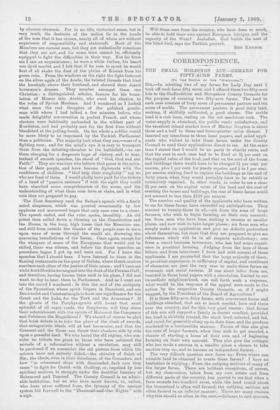by obscure channels. For in no idle, rhetorical sense, but
in very truth, the destinies of the nation lie in the hands of the men that it has chosen, nearly all of whom are without experience of responsibility and statecraft. Most of the Members are earnest men, but they are pathetically conscious that they are not, and for some time cannot be, efficiently equipped to fight the difficulties in their way. Not far from me I saw an acquaintance ; he wore a white turban, his beard was dyed scarlet, and I felt that if be rose to speak he would first of all shake the dust of the plains of Koniah from his green robe. From the windows on the right the light fastened on the silver agals of the Arabs, the twisted threads that bind the kerchiefs above their forehead, and showed their desert horsemen's dresses. They number amongst them one Christian: a distinguished scholar, famous for his trans- lation of Homer into Arabic, who owed his election to the votes of Syrian Moslems. And I wondered as I looked what were the real thoughts of the polished gentle- man with whom I had talked a few minutes before, who made delightful conversation in perfect French, and whose electors were habitually ambushed in the wildest part of Kurdistan, and had probably met for the first time without bloodshed at the polling-booth. On the whole a soldier would be more likely to be impreased by the Turkish Parliament than a politician. The majority look what they are,—sons of a fighting lace; and for the mind's eye it is easy to transport them from the debating-chamber to the battlefield,—to see them charging for a desperate Lope of victory, and to hear, instead of smooth speeches, the shout of "God, God and our Faith!" They are warriors who believe that peace is the salva- tion of their people, and have become diplomats with the confidence of children. "God help their simplicity !" say we who are fond of them. I would gladly have paid for the tickets of a band of "passive resisters" if with the sight they could have absorbed some comprehension of the scene, and the understanding of what these men have at stake, and in what coin they are prepared to pay.
The First Secretary read the Sultan's speech with a finely acted eloquence, which was greeted occasionally by low applause and murmured hopes that only once rose to a cheer. The speech ended, and the ruler spoke, inaudibly. An old priest then called down a blessing on the Constitution and the House, in the long, high tones that the Muezzins use, and still from outside the thanks of the people rose in wave upon wave of noise through the sunlit air, drowning the quavering benedictions of the Imam. Once again, except for the whispers of some of the Europeans that would not be stilled, there was silence, and before the fluent speeches on procedure began I got up and went out. For I knew the speeches that I should hear. I have listened to them in the fiamind restaurants on the quay of Galata, where Greek orators convince each other of the justice of their cause ; and 1 have sat while Arab Sheikhs harangued into the dusk of the Persian Gulf; and therefore, having known them each in his place, I did not want to-day to hear them in Parliament. And as I went out into the crowd I wondered : Is this the end of the antiquity of the Byzantium whose spirit lingers in Stamboul, and are Der-i-sadet and Constantinople to have one significance for the Greek and the Lela, for the ,Turk and the Armenian ? If the ghosts of the Porphyrogeniti still haunt that most splendid of all royal roads, the Bosphorus, will they share their astonishment with the spirits of Malannet the Conqueror and Suleiman the Magnificent? We should of course be glad that brisk debate is to take the place of the clash of swords, that antagonistic ideals will at last harmonise, and that the Crescent and the Cross can throw their shadows side by side upon a peaceful land. We who hated the old regime, who con-
sider no tribute too great to those who have achieved the miracle of a reformation without a revolution, may still be pardoned if we remember the old picture from which the colours have not entirely faded,—the chivalry of Salah ed din; the ideals, even in their decadence, of the Crusaders, and how "in crimsoned ships with dianionded, dark oars they came" to fight for Christ with Godfrey, or, impelled by less spiritual motives, to struggle under the doubtful banners of Bohetnond and Tancred. The County Council is an admir- able institution, but we who have never known, or, rather, who have never suffered from, the tyranny of the ancient system bid farewell to the "Thousand-and-One Nights" with a sigh.
Will these men from the country, who have done so much, be able to hold their own against European intrigue and the . rapacity. of the West!' Insltallalt. God builds the nest of the blind bird, says the Turkish proverb.
BEN KENDIM.












































 Previous page
Previous page